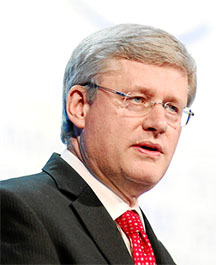OTTAWA (Reuters) – With Canada’s three main political parties all getting around 30 per cent support in polls, the odds of a period of political instability after the October 19 election are rising.
It could also shed an awkward spotlight on the constitutional role played by Governor General David Johnston, who is Queen Elizabeth II’s representative in this member of the British Commonwealth.
A proposal from Canada’s Green Party leader Elizabeth May for the two main parties on the left to take power immediately if Conservative Prime Minister Stephen Harper fails to get a majority – even if his party has more seats than anyone else – has triggered concerns that Johnston will face a very difficult decision.

While few see a full-blown constitutional crisis erupting, investors and economists warn that prolonged political uncertainty could undermine Canadian financial markets at a time when the economy has seen two straight quarters of negative growth, for many the definition of a recession, as the nation’s energy sector suffers from plunging oil prices. The Canadian dollar is already trading at near 11-year lows.
Johnston, 74, who is appointed by the Queen on the recommendation of the prime minister, is usually a figurehead who presents awards and attends commemorative events while also giving routine royal assent to Canadian laws once they pass Parliament. But after an election, he plays a critical role by asking one of the political leaders to form a new government. This is easy if one of the parties gets a majority of the 338 seats in Parliament. It gets a lot trickier if they are all short of that, and there is the possibility of a coalition being formed between parties, or at least some kind of cooperation that would allow one to govern with the other’s support.
“There could be a lot of confusion and disagreement and competing claims, and it’s not clear how those would get sorted out,” said Mark Jarvis, from Toronto-based think tank the Mowat Centre. “In a worst case scenario, we could potentially have a great deal of confusion about who has a legitimate claim to form a government.”
If Harper’s Conservatives get more seats than his two opposition left-of-center rivals, the Liberals and the New Democratic Party, then by tradition, the governor general would be expected to ask Harper to form the next government. Harper has said the party with the most seats should govern.
But some constitutional experts said the Greens’ proposal could be a viable alternative and reduce instability.
The danger if Harper forms a government without a mandate in seats or votes is that it could fail quickly.




